
Tools and Resources
Building evaluation capacity and customized tools with staying power.
CCHE embeds learning and capacity building into its evaluation work with foundations and grantees because we want our tools and methods to keep providing benefit long after we are gone. We want to share what we have developed. This page showcases a few of the formal tools and toolkits that have emerged as part of our work with communities and funders across the country.
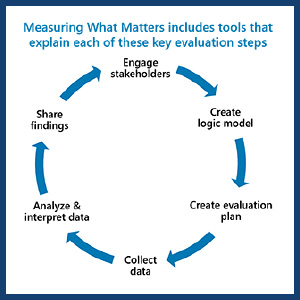
Measuring What Matters
We developed the Measuring What Matters curriculum and toolkit to support nonprofits, community collaboratives, and funders who want to understand how their programs are making a difference and communicate the results.
The toolkit breaks down evaluation into understandable steps that people can use to see if they are making progress, to learn how to improve programs in real time, and to share results with their stakeholders, including funders.

Tech Innovations Evaluation Toolkit
This toolkit is designed for founders of tech start-ups whose product is aimed at improving health or health equity. The examples throughout the toolkit are focused specifically on start-ups serving patients enrolled in Medicaid, but most content is applicable to many populations.
This toolkit is intended to be used as either a self-directed resource, a 1:1 coaching tool, or a learning collaborative tool to support formal evaluation design. The navigation allows one to jump to specific content; it is not meant to be read sequentially in one sitting.
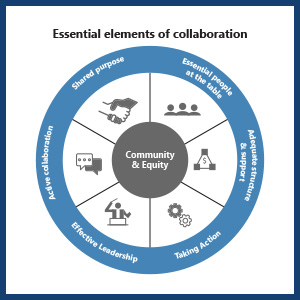
Collaboration Model
In our work, we see both the recognition that collaboration is essential and also a desire for greater understanding of what it takes to work effectively together across sectors, including what is means to have community and equity at the center and understanding that the best ideas and solutions often reside in the community itself. In response, CCHE developed a collaborative model that is grounded in our 25 years of experience evaluating multi-sector collaborative multi-site, multi-sector initiatives, informed by existing research, frameworks, and approaches.
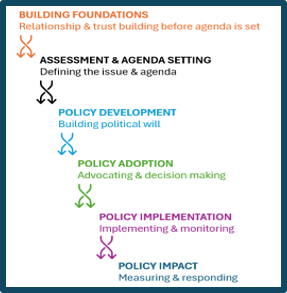
Policy Spectrum
Foundations, government agencies, and nonprofits recognize that public and organizational policy change is a pathway to sustainable improvements in community health. However, investing in and evaluating broad, complex policy initiatives is challenging. Compared to more straightforward program evaluation, policy and advocacy evaluations must contend with far more dynamic and fluid situations that are often difficult to untangle. The policy spectrum is a concrete tool that evaluators and foundations can use to focus their efforts and assess progress across multiple sites.
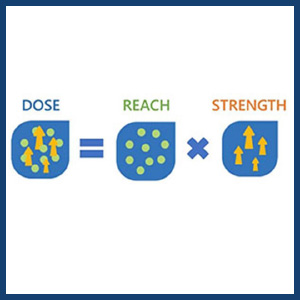
Population Dose Toolkit
Dose methods allow us to add up the impact of very different strategies using a common yardstick. Dose combines reach—the number of people affected by a strategy—and strength—the degree to which those people change their behavior. To help evaluators and community practitioners use the dose method in their work, we've created Healthy Dose: A Toolkit for Boosting the Impact of Community Health Strategies.
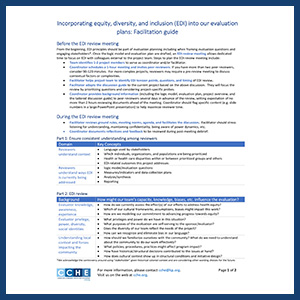
Equitable Evaluation Discussion Guide
CCHE developed a discussion guide that we use as part of our evaluation planning process. It is a work-in-progress and is informed by the work of our peers and partners. The guide provides steps, roles, and language for inviting participants to share their experiences and approaches to strengthening equitable evaluation practices. We invite others to use it and share back their reflections.
Centering equity in evaluations is important for evaluators, funders, and the communities they serve. But turning commitments into action can be challenging. Community initiatives and interventions often articulate equity as a goal without clarifying how the initiatives and interventions will advance equity or measure progress. Evaluators are also on a journey towards explicitly and systematically applying equity principles in all aspects of evaluation practice.
Trauma Informed Capacity Tool
CCHE—in partnership with our partners at the Center for Care Innovations—developed a tool to assess status and changes in organizations’ practices and capacity related to trauma- and resilience-informed care. Ideally, the tool is completed collaboratively by health organization teams to get perspectives from various roles on current organizational capabilities and practice. We created it to address what we saw as a gap in the safety net for defining practices and systems that contribute to effectively implementing trauma- and resilience-informed care in healthcare organizations.
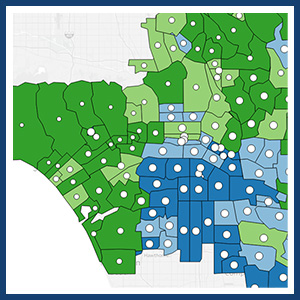
Community Health Data Platform
Every 3 years Kaiser Permanente conducts community health needs assessments (CHNAs) to guide and inform investments to improve health equity. The CHNAs are a critical tool for identifying and prioritizing community needs and assets in the eight regions Kaiser Permanente serves. To support this work, CCHE developed the Community Health data platform, which includes 85 measures organized into a set of health topics based on the County Health Rankings population health framework. Around half of the measures are available at the ZIP code level, allowing users to explore geographic and racial/ethnic disparities within each community.
